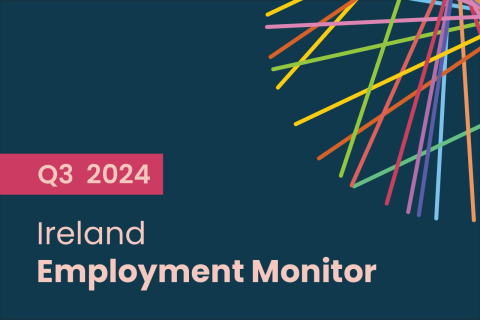Tried-and-true Tips for Managers to Secure Top Temp Talent

The misconception that a candidate-driven market automatically translates to a flooded talent pool is dangerous. Many qualified candidates have multiple offers with them and can therefore afford to be selective.
This isn't a call to rewrite the entire playbook. Many core strategies for attracting contract/temporary employees—efficient interview processes, remote work options, and clear communication—are still crucial. However, failing to adapt to the current landscape can leave hiring managers scrambling to fill crucial contract/project jobs.
This article offers a fresh perspective on tried-and-tested methods, emphasising the importance of speed and clear communication in securing the best contract employees amidst a sea of opportunities for both companies and candidates. We'll explore actionable steps to help you stand out from the crowd and land the perfect temporary fit for your organisation's needs.
Remote Flexibility: Finding the Sweet Spot Between Talent and Culture
The concept of remote work continues to evolve, and with it, the considerations for hiring contract staff. While tapping into a wider talent pool through remote options remains a significant advantage, there's a growing sentiment that some level of in-office presence can be beneficial.
The rise of hybrid work models underscores the importance of finding the right balance. For certain technical roles, prioritising a specific skill set might outweigh the in-office cultural experience, especially in a temporary setting. Imagine needing a highly skilled web developer to complete a critical project. By embracing full remote flexibility, for instance; you can search country-wide (or even globally) and find the perfect candidate with the skills you’re looking for. However, culture shouldn't be completely disregarded, but by embracing remote work options, you can significantly expand your talent pool and increase your chances of finding the perfect fit.
Talent tightrope: speed and efficiency in a niche market
Companies are scrambling to fill positions requiring highly specialised skill sets. These niche skill sets, in specialised areas such as automation or specific programming languages, are in such high demand that qualified candidates often have multiple offers with them.
The biggest frustration for recruiters in this space is slow client feedback. Imagine a scenario where you present a highly skilled .NET developer, the perfect candidate for a client's project, only to have them wait days or even a week to take a decision. By that time, your top candidate has likely accepted another offer, leaving you back at square one.
The urgency of action cannot be overlooked in temp recruitment. With competition fierce for these niche skill sets, hesitation can be costly. Think of it like this: the companies that are constantly recruiting often target highly specific skill sets crucial for their digital transformation initiatives. They understand that these niche skill sets are the key to unlocking growth and innovation in the age of AI and automation. The same urgency applies to other in-demand professional disciplines, like finance regulation, where talent wars are equally intense.
Our recent research found that ‘lack of skilled candidates available’ is the main hiring challenge 34% of employers expect to face in the coming year.
This talent shortage, coupled with the high demand for specific skill sets, has led many companies to acknowledge the need to adjust their compensation strategies. While offering competitive rates is certainly important, it's only one piece of the puzzle. The true differentiator lies in streamlining the hiring process.
Streamlining interviews for top temp talent
Speed can add value in the race for temporary talent. With skilled candidates juggling multiple offers, every wasted day can mean losing the perfect fit. While streamlining the interview process might seem like a tall order, there are several strategies that can significantly reduce time-to-hire without sacrificing quality.
One effective strategy is scheduling back-to-back interviews. This might seem like a significant time investment for the hiring manager, but the benefits outweigh the initial commitment. By interviewing candidates for the same role in close succession, managers can compare their qualifications and responses more effectively. Imagine interviewing three data analysts on the same day. Seeing them back-to-back allows you to assess their analytical skills and technical knowledge side-by-side, ensuring a more accurate evaluation. This approach also benefits the candidates, as they receive feedback more quickly and avoid the frustration of waiting days or even weeks to hear back.
The concept of back-to-back interviews isn't new. Historically, companies would bring potential hires on-site for a series of in-person interviews. The rise of remote work has transformed this approach into a virtual setting. The hosted interview process takes advantage of this shift, allowing you to conduct back-to-back interviews online, saving valuable time and resources. This streamlines the process for both you and the candidates, leading to a faster decision-making timeline.
Here are some additional tips to expedite your contract recruitment process:
- Pre-hire communication: Set clear expectations upfront with your recruiter regarding interview timelines.
- Prompt Feedback: Develop a system for gathering and delivering feedback to candidates as quickly as possible. Knowing your preferred time frame for feedback upfront allows consultants to manage expectations effectively.
- Pre-scheduled Senior Stakeholder Meetings: If a second interview or involvement from senior decision-makers is anticipated, block out that time in advance. This proactive approach eliminates delays and ensures a smooth interview experience.
A defined plan to placement, a term commonly used in permanent recruitment, is just as applicable to the contract staffing world. By focusing on speed and clear communication, you can secure the top temp talent your organisation needs to thrive.
Standing out in a sea of options: selling temporary roles to top talent
With skilled professionals juggling multiple offers, how can you ensure your temporary roles stand out?
One strategy is to focus on the value proposition for the candidate. This goes beyond simply offering a paycheck. Consider how the contract role can add value to their skillset and career trajectory. Imagine a temporary role managing a social media campaign for a marketing agency. This could be a valuable opportunity for someone looking to gain experience in the digital marketing field, even if the position itself is temporary. By highlighting these potential benefits during the interview process, you can make the temp role more attractive to top talent.
While assessing a candidate's skills is crucial, don't neglect the opportunity to showcase your organisation's culture and vision. Discuss the company's long-term strategy and how the temporary role contributes to the bigger picture. This allows candidates to see the potential impact of their work and feel invested in the organisation's success.
Positive candidate experience plays a major role in attracting top talent. Remember, the best candidates often have multiple options. If the interview process feels impersonal or overly long, they may choose to pursue another opportunity. Here are some key considerations for creating a positive candidate experience:
The approach can be slightly nuanced depending on the type of contract role (short-term vs. long-term). For short-term assignments (a few weeks), emphasising the development opportunities and positive candidate experience might be most effective. For longer-term contracts (maternity cover, fixed-term projects), you can delve deeper into the project details and how the candidate's work will contribute to the organisation's goals.
It's important to be realistic about compensation. Top talent commands a premium, and temporary roles are no exception. Listen to your consultants' advice regarding market rates and consider budget flexibility when necessary. Be prepared for potential salary negotiations to secure the best candidate for the role.
Working day trials: A powerful tool in the right scenario
Working day trials are an interesting alternative to traditional interview processes and well worth considering for increased speed. They allow a candidate to showcase their skills in a real-life work setting, which can be helpful for both employers and candidates.
The success of working day trials depends on trust. Clients are more likely to be on board if they trust the judgement of the recruitment consultant recommending the candidate. Recruitment agencies can build trust by having programmes that create a pool of reliable and proven candidates.
Where does it work best?
- Technical Skills Focus: Working day trials are a great fit for roles where technical skills are paramount. The candidate can showcase their abilities through hands-on work.
- Shorter-Term Roles: For contract positions with less emphasis on cultural fit, a working day trial can be an efficient way to identify a qualified candidate.
Technology can also play a role in making contract recruitment more efficient. For example, a system where top candidates can pre-record video introductions of themselves can help agencies screen a wider range of talent quickly, especially when there is an urgent need to fill a position.
Overall, working day trials have the potential to be a valuable tool for streamlining temporary recruitment. By addressing client concerns, focusing on value, and leveraging existing strengths, recruitment agencies can position themselves at the forefront of innovative talent acquisition strategies.
By adopting these strategies, you can move beyond traditional interview processes and secure the top temp talent your organisation needs. Embrace clear communication, efficient planning, and innovative approaches to find the perfect temporary talent quickly and seamlessly. Speak to us for a more nuanced approach to temp hiring.














